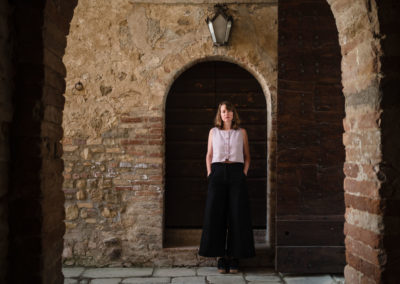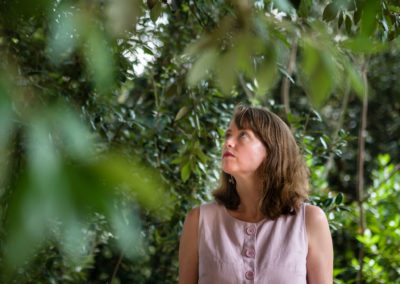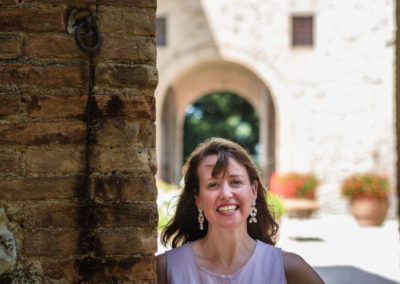While in residence at Civitella, I finished a rough draft of my next book, a collection of short stories titled Aftermath, and also began work on a longer project. In the mornings, I handwrote and read, usually outside on a terrace or in a garden, and then worked in my studio through the late afternoon. My time at Civitella has been one of the most productive stretches of my artistic life.
Karolina.
I first saw Karolina outside the Sumesa, on the corner of Avenida Oaxaca and Álvaro Obregón. She was smoking a stubby cigarette, a sled-like backpack hitched to her shoulders. I stopped short on the street corner, felt my heart hitch in my chest. Could it be? The second time was by a bus stop.The third time was in Parque México, late at night. I was tracing the serpentine paths back to my hotel in Condesa, after a work dinner in Roma Sur, when I came upon Karolina asleep on a park bench by the dog run, squeezing her giant backpack like a lover.
It was only when I saw her in the dark that I was sure.
Karolina was my brother’s ex-wife. They had divorced five years ago, in Seattle; before all that, she went missing for fifteen days, a period of time still marked by dread and shame.
I had decided to walk back to my hotel because I was having trouble sleeping and a long walk before bed, imagining the alertness being drained from my body one step at a time, seemed like a preemptive strike against insomnia. In Parque México, the dog run was empty except for a young man throwing a tennis ball for a German Shepard. The owner was wearing sunglasses, despite the hour. I was just past the run, in the thick green center of the park, when I came upon her.
The city was four months past the earthquake, the most devastating to strike since the eighties. The moment I heard the news, I’d called my friend in the conservation department of the National Museum of Anthropology. He and his family were safe, though a residential building in their neighborhood had collapsed and thirty-two people had lost their lives. At home in Miami, as I watched the death toll tick up on my laptop, it had never occurred to me that Karolina had been in danger here too.
The man in sunglasses leashed the German Shepard and left the run. He whistled. The dog carried the tennis ball in his mouth. I wondered where they had been when the earth started to thrash under their feet, if they had been afraid. I knelt by the bench. I touched Karolina’s cheek. Her skin was sticky and cool. I grasped her shoulder. I willed her to open her eyes, but she seemed to be fast asleep.
“Karolina,” I said.
My voice jolted her into the waking world. She stared—unblinking, hardly breathing it seemed—and then her mouth yawned open, exposing the sheen of molars, and she screamed. I fell backwards, as though shoved, my palms pressed to the concrete path. “Karolina,” I said again, but she leapt to her feet and ran away, knees high, her giant backpack upright in her arms. I watched as she rounded a bend and disappeared into the night.
A moment later, the man with the German Shepard burst through the darkness, coming from the opposite direction as the one Karolina had gone in. He rushed to my side. He took me by the arm and helped me up.
“Are you all right?” he asked, in Spanish. “I heard a scream. Were you attacked?”
HadI been attacked? It nearly felt that way.
I was conversationally fluent in all the Romance languages, as this was important for my work in art restoration, so I lied and told the man that I had fallen, tripped over something in the dark.
He nodded and released my arm. I noticed him looking around, as though searching for whatever it was I had tripped over. His sunglasses were crooked on his face. The German Shepard paced a circle around me—full of suspicion, I couldn’t help but think—and then dropped the tennis ball at my feet.



